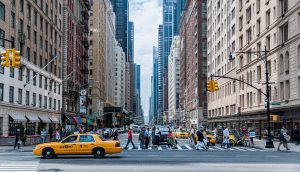


On January 26, the University of Pennsylvania’s Think Tanks and Civil Societies Program (TTCSP) released its 10th Annual Think Tank Report. This list ranks thousands of think tanks worldwide and ranks them in dozens of different categories.
The “think tank of think tanks” has a rigorous ranking criteria which includes:
“quality mitment of the think tank’s leadership,”“quality, number, and reach of publications,”“reputation with policymakers,”“media reputation,”“ability to produce new knowledge,”“financial stewardship,” and“impact on society.”
Chatham House was named “Think Tank of the Year” while Brooking Institution was listed as the “Top Think Tank Worldwide” and the “Top Think Tank in the United States.” Acton and its Argentine subsidiary, Instituto Acton both appeared in the report:
Acton Institute is 11th (out of 100) in the Top Social Policy Think Tanks ranking (9th in 2015).Acton Institute is 29th (out of 90) in the Top Think Tanks in the United States (29th in 2015).In Top Think Tanks Worldwide, Acton ranks 156th (out of 175) (155th in 2015).8th (out of 90) in Best Advocacy Campaign (10th in 2015) for PovertyCure.24th (out of 65) in Best Think Tank Conference (17th in 2015) for Acton University.Instituto Acton was ranked 138th (out of 148) Best Independent Think Tanks (100th in 2015)
Acton has appeared in this report since 2010; Instituto Acton was first ranked in last year’s report and it officially became a subsidiary of Acton in 2015.
There are nearly 7,000 thinks worldwide and 2,000 in North America. Of those, 1,835 are located in the United States with one quarter of them in Washington, DC. Nearly 55 percent of all think tanks worldwide are either in the United States or Europe.
In his introduction to the report, James G. McGann addressed trends in think tanks and the 2016 presidential election. “Donald Trump and Bernie Sanders both tapped into the deep discontent in a sizable segment of the American electorate,” he explained. “The platforms of these two candidates were cut from the same cloth but are sewn by different tailors. They are both Nationalists, Nativists and Protectionists.” He sees this rise in populism as, simply, “a protest vote against the financial, intellectual and political elites.”
He also offers several explanations of the great discontent of the global electorate:
Globalization fed into an economic insecurity and sense of loss for many AmericansInternational terrorism, violent crime, and drug use has caused a “physical insecurity” for munitiesDemographic shifts are leading to a loss of a sense of national and personal identityThe world has shifted from being “bi-polar” to “multi-polar;” meaning no one and everyone is in chargeLeaders have failed to understand the needs of their citizens causes a “crisis of confidence” in government
Visit UPenn’s Think Tanks and Civil Societies Program for the full report.









